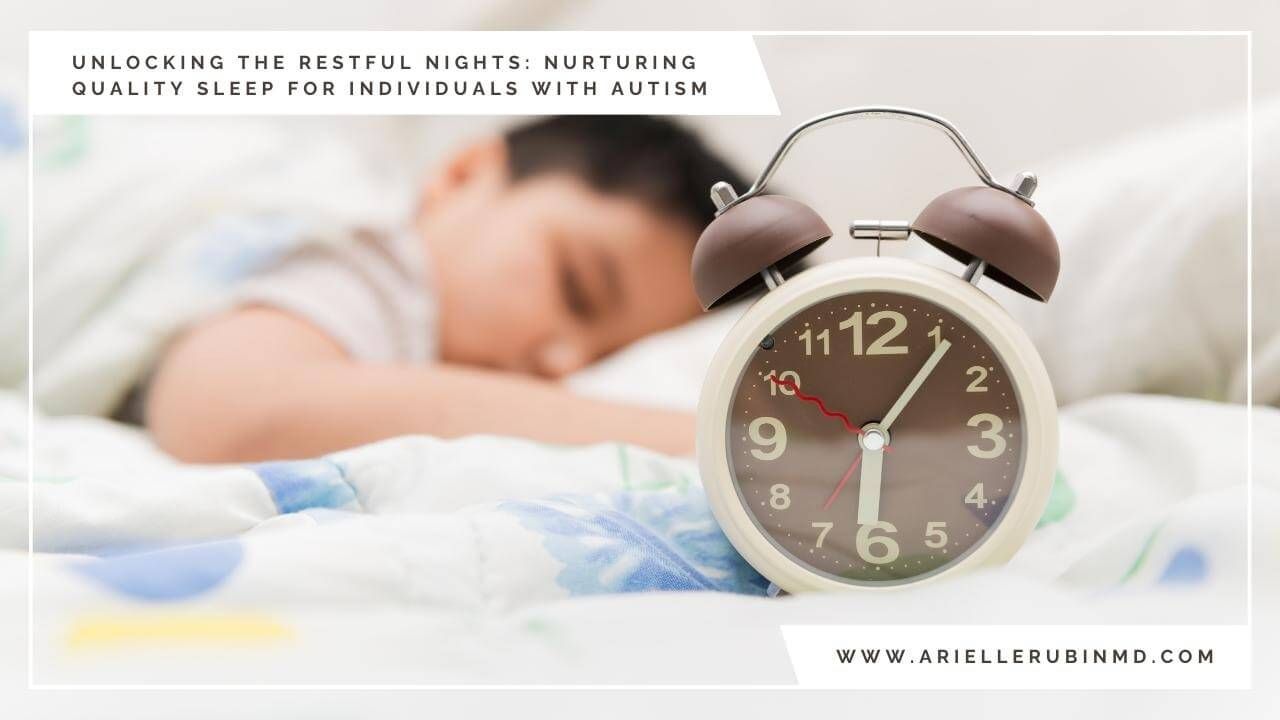Unlocking the Restful Nights: Nurturing Quality Sleep for Individuals with Autism
Jun 19, 2023
As a dedicated parent of an autistic individual, you’ve conquered numerous challenges in raising a child with autism. However, one hurdle that many parents face is managing sleep difficulties in their autistic children.
Quality sleep is vital for individuals on the autism spectrum, yet research shows that they experience sleep disturbances more frequently than those without autism.
This blog post aims to shed light on the prevalence of sleep problems in autism and provide insights into understanding and addressing them effectively.
Sleep issues affect a significant proportion of individuals on the autism spectrum, with approximately 50 to 80% experiencing difficulties compared to only 10-30% in the non-autistic population.
These sleep problems can have negative consequences that pose additional challenges for autistic individuals, such as:
- Inattention
- Hyperactivity
- Repetitive behavior patterns
As a child psychiatrist, I frequently witness these side effects and emphasize the importance of understanding the underlying causes to explore personalized treatment options.
There are four main categories of sleep issues in autism:
- Biological causes: Unique brain development and maturation patterns in autism can lead to abnormal brain electrical activity in sleep. Doctors call these “sleep waves.” Some studies have found that some autistic individuals retain sleep wave patterns resembling those found in infants, which have a very different sleep cycle than an older child or adult. Circadian rhythms, the body’s internal clock that tells you when to go to sleep, is also disrupted in autism. Autism is a risk factor for altered or even absent circadian rhythm-related genes. Additionally, lower and slower melatonin production, the hormone responsible for sleep induction, has been observed in those on the spectrum.
- Psychological hyper-arousal: Heightened thinking activity is one proposed theory behind the increased prevalence of insomnia in autistic individuals. Overthinking, excessive worry, and anxiety can keep your child’s mind in constant overdrive, making it challenging for them to fall asleep.
- Sensory/external hyper-arousal OR hyper-reactivity: Those with higher sensory issues in autism have worse sleep patterns. Sensory overload from noises, lights, textures, or even the feeling of sheets on the skin can be overwhelming and prevent them from settling into a restful state or can wake someone up during the night. These sensory challenges can lead to increased anxiety, agitation, and difficulty in self-soothing, all of which can disrupt the sleep routine.
- Behavioral insomnia: This is the most common type of sleep issue in autistic and neurotypical kids alike! It occurs when a child develops problematic sleep habits or associations that interfere with their ability to fall and stay asleep. This can manifest in various ways, such as difficulty settling down at bedtime, reliance on specific routines or objects to initiate sleep, or frequent nighttime awakenings. Behavioral insomnia often results from learned behaviors or environmental factors, such as inconsistent bedtime routines, excessive stimulation before bed, or parental reinforcement of nighttime awakenings.
It’s important to remember that medical causes can coexist with autism and exacerbate sleep problems.
Gastrointestinal issues, sleep apnea, allergies, anemia, epilepsy, and psychiatric disorders are common conditions affecting sleep in individuals with autism. Additionally, certain medications prescribed for autism may have side effects that interfere with sleep quality. Therefore, it is crucial to rule out these medical factors and consult with healthcare professionals to address any underlying issues.
Things to look out for that may affect sleep:
- Predisposing factors such as coexisting developmental problems, intellectual disability, chronic pain, etc.
- Precipitating factors such as coexisting medical conditions (such as anxiety or epilepsy) or medication history
- Perpetuating factors such as daytime napping, new evening routines, new diet changes, co-sleeping with your child, or changes in routine, wake-up times
When assessing and diagnosing sleep disorders in autism, taking a detailed history is the first step. This includes gathering information about your child’s sleeping patterns and considering predisposing, precipitating, and perpetuating factors that may affect sleep. Sleep symptom questionnaires and sleep diaries can provide valuable insights for parents and doctors to determine the causes of sleep issues and develop appropriate interventions.
Sleep Symptom Questionnaires
You can fill out numerous questionnaires on behalf of your child to help you and your doctor determine the cause of sleep issues. The most widely-used questionnaire is the Children’s Sleep Habit Questionnaire (CSHQ), and you can grab a copy HERE.
Sleep Diaries
This involves you making a sleep diary in which you record your child’s daily sleep-related pattern, including the time they go to bed, the time and number of nighttime awakenings, the time the child awakens, and the time and number of daytime naps. Sleep diaries provide additional information regarding your child’s sleep pattern at multiple sleep points—links below for the ones I recommend for kids, teens, and adults:
By understanding the complex nature of sleep problems in autism, we can take steps to significantly enhance the sleep quality, mood, and daily functioning of autistic individuals.
While the answers may not always be immediate or straightforward, the journey of discovery and intervention can lead to a better quality of sleep and life for your loved one. Remember, you are not alone in this process, and seeking professional guidance and support can make a significant difference in nurturing restful nights for individuals with autism. Together, we can unlock the potential for better sleep and overall well-being.
Get notified when new blogs are posted and get exclusive insights by joining my weekly newsletter!

